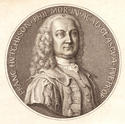 Francis Hutcheson (1694-1746) is often described as "the father of the Scottish Enlightenment" which advocated that science and the use of reason would improve the human condition. He was closely associated with the city of Glasgow through the University. He was born at Drumalig, a township in Sainfield, County Down, on 8 August 1694. His father and grandfather were Presbyterian ministers and his grandfather had emigrated from Ayrshire to Ulster. Francis received a classical education in Ulster before proceeding to Glasgow University in 1710, a common trend among many Ulster Presbyterians. He gained his MA in 1712 and he continued his studies with a course in theology until 1717. He returned to Ulster in 1718 to be licensed as a minister but instead he ended up running an Academy for Dissenters in Dublin, a position which he held for ten years.
Francis Hutcheson (1694-1746) is often described as "the father of the Scottish Enlightenment" which advocated that science and the use of reason would improve the human condition. He was closely associated with the city of Glasgow through the University. He was born at Drumalig, a township in Sainfield, County Down, on 8 August 1694. His father and grandfather were Presbyterian ministers and his grandfather had emigrated from Ayrshire to Ulster. Francis received a classical education in Ulster before proceeding to Glasgow University in 1710, a common trend among many Ulster Presbyterians. He gained his MA in 1712 and he continued his studies with a course in theology until 1717. He returned to Ulster in 1718 to be licensed as a minister but instead he ended up running an Academy for Dissenters in Dublin, a position which he held for ten years.
In the 1720s he began to publish his work. In 1724 he attacked existing beliefs about morality and in 1725 An Inquiry into the Original of Our Ideas and Beauty, his most famous work, was published. In addition to his other writings, in 1728 he wrote his influential work An Essay on the Nature and Conduct of the Passions and Affections. With Illustrations upon the Moral Sense. By this time, Hutcheson had acquired a considerable intellectual reputation and in 1729 he was appointed to the Chair of Moral Philosophy at Glasgow. By all accounts he was a brilliant lecturer and profound academic who had an impact on both his peers and students. He cared for less wealthy students, helping them with money and not charging admission fees to his lectures.
In 1745 he turned down a better-paid position as Professor of Moral Philosophy at Edinburgh. He died through illness on a visit to Dublin. In 1755 his System of Moral Philosophy was posthumously published. His works had an impact on American thinkers such as Thomas Jefferson. Hutcheson was at the forefront of what has been called the "Glasgow Enlightenment".